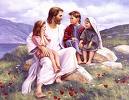| Next | Previous | Index | Tellout Home |
3. Christian Faith People
Early Church Model
 The Household of Faith program aims to encourage Christian faith people in the church. It will help to build the Christian community in an area and strengthen congregations both locally and nationally. A group of lay people and clergy from across the Diocese of Toronto worked on the Household of Faith Program over several years.✞
The Household of Faith program aims to encourage Christian faith people in the church. It will help to build the Christian community in an area and strengthen congregations both locally and nationally. A group of lay people and clergy from across the Diocese of Toronto worked on the Household of Faith Program over several years.✞
Building Christian Faith
 The Household of Faith intends to become an extension of the local church that trains and nourishes Christian people and divides and double its membership every two years. "What we're doing is looking at the Early Church model when groups of people met in homes. Friends would come along. It would become a large extended family group with many children, parents, grandparents, widowed people, and others who are curious and are invited or even wander in."✞
The Household of Faith intends to become an extension of the local church that trains and nourishes Christian people and divides and double its membership every two years. "What we're doing is looking at the Early Church model when groups of people met in homes. Friends would come along. It would become a large extended family group with many children, parents, grandparents, widowed people, and others who are curious and are invited or even wander in."✞
Encourage Commitment
The current idea is not a new one but based on the Early Church model. It is basically to use the home as a center for evangelism and as a place where Christians can go out and "share the faith." It builds not on someone on a street corner preaching or a person being argued into the Faith on the doorstep, but by socializing with Christian people and being attracted to the Faith that they exhibit.✞
House Faith Time
 The House Faith time aims to encourage the gathered people to enter into a covenant to bring others to Christ. "Building a covenant is not simply about getting everybody to agree about what the House is going to study. At the covenant's heart is the willingness to patiently listen to each other." The Household gathering time could be during the day or evening, but the actual people attending would be something that's decided by the group.✞
The House Faith time aims to encourage the gathered people to enter into a covenant to bring others to Christ. "Building a covenant is not simply about getting everybody to agree about what the House is going to study. At the covenant's heart is the willingness to patiently listen to each other." The Household gathering time could be during the day or evening, but the actual people attending would be something that's decided by the group.✞
Know Christ Better
 "The Household of Faith model is flexible enough to include all kinds of variations." For example, the teaching material and the study time could vary according to the wishes of the people. Households could include children or teenagers, or there could be separate programs for them. The focus of the Household would be on teaching, sharing, and worship. "What each group would seek to do is to learn together and grow together as Christians over these two years." After two years, at the end of the household covenant, they would form two new Households. New Households must move on at the end of the covenant period.✞
"The Household of Faith model is flexible enough to include all kinds of variations." For example, the teaching material and the study time could vary according to the wishes of the people. Households could include children or teenagers, or there could be separate programs for them. The focus of the Household would be on teaching, sharing, and worship. "What each group would seek to do is to learn together and grow together as Christians over these two years." After two years, at the end of the household covenant, they would form two new Households. New Households must move on at the end of the covenant period.✞
Household Faith Group
 The Household of Faith group is a perfect environment for Baby Boomers and Millennial people to meet, socialize, and deepen their faith. "The whole program of the Household of Faith is an evangelistic one. We don't want a house group to become a Bible study group in the old model where they do the same thing year after year with the same few people. The challenge is to bring in new people." By new people, these could be from the congregation or those who only occasionally go to church. A Household of Faith group seeks to take people to a higher level of spirituality. It aims to bring the group closer to other Christians. People committed to one another, and the church will deepen their faith. Your Household of Faith group is the perfect place for Baby Boomers, as well as the Millenniums who wouldn't necessarily go to church to get together, talk about their faith, and grow in it. Another benefit of the Household is using it in areas where churches are few and far between."✞
The Household of Faith group is a perfect environment for Baby Boomers and Millennial people to meet, socialize, and deepen their faith. "The whole program of the Household of Faith is an evangelistic one. We don't want a house group to become a Bible study group in the old model where they do the same thing year after year with the same few people. The challenge is to bring in new people." By new people, these could be from the congregation or those who only occasionally go to church. A Household of Faith group seeks to take people to a higher level of spirituality. It aims to bring the group closer to other Christians. People committed to one another, and the church will deepen their faith. Your Household of Faith group is the perfect place for Baby Boomers, as well as the Millenniums who wouldn't necessarily go to church to get together, talk about their faith, and grow in it. Another benefit of the Household is using it in areas where churches are few and far between."✞
Christian House Leader
 The Church aims to build up a strong Christian house leader and mature spiritual Christians in each Household of Faith. Eight to twelve people make up a Household of Faith. Some could be core members of the local church, while others may be fringe church members. "They would make a covenant to meet together every week." Both the host and leader would be appointed by the Church leadership, who would meet with them regularly for instruction and to coordinate their activities. A respected and competent person would act as the leader, whose main job would be to run the House. The host is willing to open his or her home for a gathering every week. The clergy in the church where the Households are situated would oversee the Household's formation. Usually, clergy would not attend Households once they are formed, except to celebrate a communion service. The clergy's role is to equip the Christian house leader, train new leaders, and retain oversight of the Household group. Once a Household forms, one of its first tasks is to agree on how the meeting time will look.✞
The Church aims to build up a strong Christian house leader and mature spiritual Christians in each Household of Faith. Eight to twelve people make up a Household of Faith. Some could be core members of the local church, while others may be fringe church members. "They would make a covenant to meet together every week." Both the host and leader would be appointed by the Church leadership, who would meet with them regularly for instruction and to coordinate their activities. A respected and competent person would act as the leader, whose main job would be to run the House. The host is willing to open his or her home for a gathering every week. The clergy in the church where the Households are situated would oversee the Household's formation. Usually, clergy would not attend Households once they are formed, except to celebrate a communion service. The clergy's role is to equip the Christian house leader, train new leaders, and retain oversight of the Household group. Once a Household forms, one of its first tasks is to agree on how the meeting time will look.✞
"Christian Faith People"
by Ron Meacock © 2021
| ^Top Page | Next | Previous |